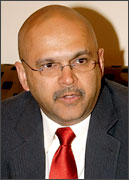'Corporate bond market - potential for growth'
Rebranding follows reorganisation:
by Surekha Galagoda
[email protected]
 |
 |
|
Suresh Menon |
Dr. Yeah Kim Leng
- Pix Chinthaka Kumarasinghe |
Lanka Rating Agency (LRA) last week changed its name to RAM Ratings
(Lanka) Ltd. The re-branding follows the reorganisation exercise at its
Malaysian Parent Company RAM Holdings Berhard ("RAM Holdings," formerly
known as Rating Agency Malaysia Berhard).
As a part of the re-branding exercise the Executive Director of RAM
Holdings Berhard Suresh Menon and the Chief Economist Dr Yeah Kim Leng
was in Sri Lanka. Sunday Observer Business interviewed Menon and Dr Leng.
Here are excerpts from the interview:
Q: What are your views on Sri Lanka's economy?
A: The growth in the 1980's and 1990's despite the protracted
civil war your country managed to achieve an average growth of 5% and
that is commendable given the problems Sri Lanka had to face and really
even a civil war has not really resulted in a situation where you see
negative growth.
More recently in the past five years Sri Lanka has achieved a growth
of 6.2% per annum compared to Malaysia which achieved a growth of 5.8%
and in real terms Sri Lanka's economy is growing at a higher rate
compared to Malaysia although the base is lower which is the main
difference.
The income levels in Sri Lanka are lower than Malaysia. The average
per capita income is about US$ 1500 in Sri Lanka while it is US$5000 in
Malaysia. But in growth rates Sri Lanka is growing much higher than
Malaysia. This is where you can attract more investments because Sri
Lanka is able to achieve sustained growth at moderately high levels and
we are quite positive about the potential.
The growth is now driven by domestic demand and consumer spending is
growing at 4.8% per annum. It is moderately strong. More interesting is
that private investment has been growing at double digit averaging 12%
for the last five years. Private investment can be sustained and will
continue to be sustained medium to long term growth potential for Sri
Lanka and this is where the corporate bond market comes in to finance
the growth. Sovereign rating
Q: What is a rating? What is the benefit of it for a country's
financial institution or a company?
A: A sovereign rating is an assessment of an entire country.
This shows how a country is performing and these ratings are given by
international rating agencies such as Standard & Poor's or Moodys.
Then you have the domestic ratings. These are companies within that
country. That depends how they perform within that country. Benchmark or
universal rating companies are companies within the country.
A rating is a measure of your credit worthiness or your ability to
repay or fulfil your financial obligations. Each country/company has a
different ability to fulfil the obligations. Then you grade the ability
as a triple A., double A etc.
In the event a company is rated triple A, a person who invests in
that company will earn a lower interest while the individual can demand
a higher rate when the rating goes down the scale as the risk is higher.
In this way in a rating you encourage right discovery.
There are also the financial institutions' ratings. A rating
differentiates the performance of each individual bank.
A country has three ratings which includes financial institution
ratings, the sovereign ratings and the corporate ratings.
Q: What are the parameters used in rating a country?
A: Sovereign ratings are done by International rating agencies
such as Standard & Poor's and Moodys.
The parameters considered are the country's economic performance such
as the GDP growth rate, per capita income, current account deficit which
all relate to hard numbers and soft factors such as political stability
and human rights. It is assumed that USA and the OECD block are triple A
rated.
Q: Are all rating agencies independent?
A: If you are not independent you should not be in business.
This is my view. If investors don't trust your ratings you won't have
business. The whole business depends on trust and credibility.
If you are not independent and if you are not objective sooner or
later your business will crash as nobody will want your ratings. Then
you can't be in business. Therefore all rating agencies should be
independent.
Bond market
Q: What is the situation of the bond market in Sri Lanka?
A: The government bond market is fairly large while the
corporate bond market is fairly small with Rs 2.2 bln being raised last
year.
Since the corporate bond market is small we think that there is
potential for growth as the infrastructure investment has to be funded.
US$ 4.5 bln is needed as infrastructure and how is this going to be
funded a part will be funded by the international agencies while the
balance can be funded by the corporate bond market. It will become very
efficient.
In the 1980's the savings rate was 15% while in the 1990's it was
close to 20% and more recently it has risen to 23-24% and that is mainly
because of the growth in the banking sector which has to mobilise more
savings.
In all developed countries there is a strong banking sector and a
deep capital market. In Sri Lanka the bond market is missing. If this
can be developed the national savings rate can increase at a fast rate
and the savings investment gap which at present stands at 3.2% .
The bond market can help to raise investment levels to a much higher
level which is currently hovering around 26-28%.
The country has a very large infrastructure financial requirement and
the current administration is looking at spending over 20% of GDP or
US$4.5 bln on infrastructure projects. Since there are budgetary
constraints RAM ratings can help the country in this aspect by project
financing through the bond market.
RAM Holdings, an affiliate of Standard & Poor, the world's largest
international rating agency is also embarking on a regional expansion
program that seeks to fortify its franchise as the most influential
domestic agency in the ASEAN.
Menon joined RAM as one of its founding staff in 1990 and played a
key role in the development of credit rating services and the bond
market in the country.
He has represented RAM at numerous fora and dialogues.
Dr Leng has been with RAM since 1994, initially as the head of
economics and Market research department. |
